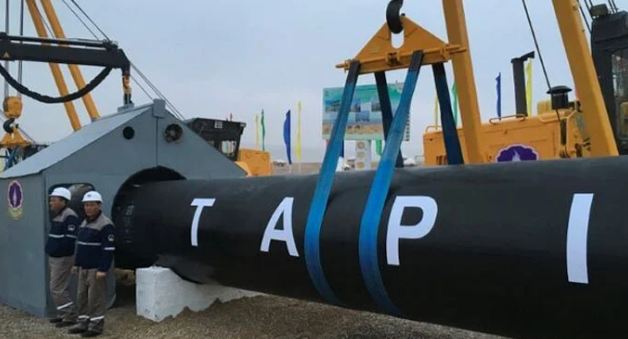“Without India, Pakistan would have to give a transit fee of $500 million per annum apart from gas price,” say officials
Monitoring Report
ISLAMABAD: Pakistan’s top functionaries are pondering on quitting $10 billion 1,849km Turkmenistan-Afghanistan-Pakistan-India (TAPI) gas line project if India does not want to become a part of it, officials said.
The trans-nation project without India would become TAP, which will not be sustainable for Pakistan anymore. Officials said, “One of the top men of Petroleum Division sensitised the [General Headquarters] GHQ some days back, informing them India’s response is extremely lukewarm towards the project. Without India, Pakistan would have to give a transit fee of $500 million per annum apart from gas price of $7.5 per mmbtu.”
They said the gas price from Turkmenistan would exceed the costly RLNG price, adding this is how the country would have to pay $5 billion per annum, which is not sustainable. Background discussions with top energy and SIFC officials also suggest if India stays a part of the project, Pakistan would get transit fee from Delhi in the range of $700-800 million per annum.
This is how it would save $200-300 million per year just in the head of transit fee and price of gas from Turkmenistan would be economical for Pakistan. In this scenario, India would have to give two transit fees separately to Afghanistan and Pakistan. The TAPI gas pipeline project aims to bring natural gas from Galkynysh gas field (formerly called South Yoloten) in Turkmenistan to Afghanistan, Pakistan and India.
The pipeline with diameter of 56 inch will transport up to 33 billion cubic meters (average 3.2bcfd) of natural gas per year over a 30-year period. Pakistan and India would have offtake of 1.35bcfd each and 500mmcfd to be used in Afghanistan.
From Afghanistan, it has to enter from Herat and Kandahar to Chaman. It will pass through Zhob, DG Khan and Multan and will reach Fazilika (Pak-India border) to enter India. Turkmenistan will be having 85% share in the project, while Afghanistan, Pakistan and India would each have 5% share of $200 million.
India had not completely walked away from the project but was cautious and non-committal due to security challenges and evolving political situation in Afghanistan and Pakistan. India, earlier, quit the IPI gas pipeline, and in return it got a lucrative package from US.
As far as Pakistan is concerned, gas consumption has dwindled by 150mmcfd per month. In the current calendar year, gas pressure in the shape of line pack pressure increased over an alarming figure of 5bcf (billion cubic feet) for about seven times, putting national gas transmission system in jeopardy because of non-utility of gas in the country.

















